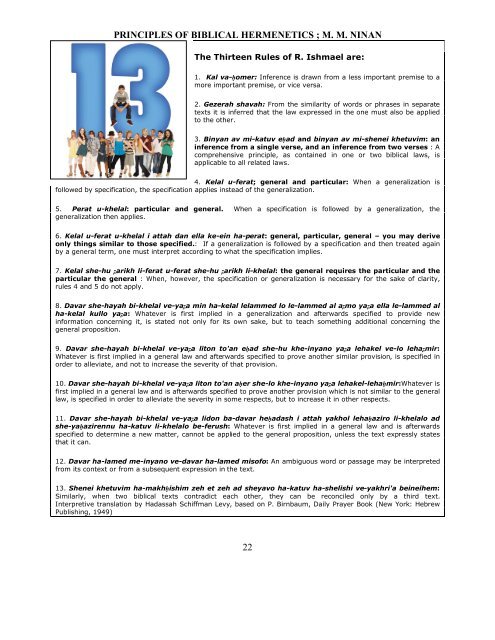Biblical Hermeneutics
Create successful ePaper yourself
Turn your PDF publications into a flip-book with our unique Google optimized e-Paper software.
PRINCIPLES OF BIBLICAL HERMENETICS ; M. M. NINAN<br />
The Thirteen Rules of R. Ishmael are:<br />
1. Kal va-ḥomer: Inference is drawn from a less important premise to a<br />
more important premise, or vice versa.<br />
2. Gezerah shavah: From the similarity of words or phrases in separate<br />
texts it is inferred that the law expressed in the one must also be applied<br />
to the other.<br />
3. Binyan av mi-katuv eḥad and binyan av mi-shenei khetuvim: an<br />
inference from a single verse, and an inference from two verses : A<br />
comprehensive principle, as contained in one or two biblical laws, is<br />
applicable to all related laws.<br />
4. Kelal u-ferat; general and particular: When a generalization is<br />
followed by specification, the specification applies instead of the generalization.<br />
5. Perat u-khelal: particular and general. When a specification is followed by a generalization, the<br />
generalization then applies.<br />
6. Kelal u-ferat u-khelal i attah dan ella ke-ein ha-perat: general, particular, general – you may derive<br />
only things similar to those specified.: If a generalization is followed by a specification and then treated again<br />
by a general term, one must interpret according to what the specification implies.<br />
7. Kelal she-hu ẓarikh li-ferat u-ferat she-hu ẓarikh li-khelal: the general requires the particular and the<br />
particular the general : When, however, the specification or generalization is necessary for the sake of clarity,<br />
rules 4 and 5 do not apply.<br />
8. Davar she-hayah bi-khelal ve-yaẓa min ha-kelal lelammed lo le-lammed al aẓmo yaẓa ella le-lammed al<br />
ha-kelal kullo yaẓa: Whatever is first implied in a generalization and afterwards specified to provide new<br />
information concerning it, is stated not only for its own sake, but to teach something additional concerning the<br />
general proposition.<br />
9. Davar she-hayah bi-khelal ve-yaẓa liton to'an eḥad she-hu khe-inyano yaẓa lehakel ve-lo lehaẓmir:<br />
Whatever is first implied in a general law and afterwards specified to prove another similar provision, is specified in<br />
order to alleviate, and not to increase the severity of that provision.<br />
10. Davar she-hayah bi-khelal ve-yaẓa liton to'an aḥer she-lo khe-inyano yaẓa lehakel-lehaḥmir:Whatever is<br />
first implied in a general law and is afterwards specified to prove another provision which is not similar to the general<br />
law, is specified in order to alleviate the severity in some respects, but to increase it in other respects.<br />
11. Davar she-hayah bi-khelal ve-yaẓa lidon ba-davar heḥadash i attah yakhol lehaḥaziro li-khelalo ad<br />
she-yaḥazirennu ha-katuv li-khelalo be-ferush: Whatever is first implied in a general law and is afterwards<br />
specified to determine a new matter, cannot be applied to the general proposition, unless the text expressly states<br />
that it can.<br />
12. Davar ha-lamed me-inyano ve-davar ha-lamed misofo: An ambiguous word or passage may be interpreted<br />
from its context or from a subsequent expression in the text.<br />
13. Shenei khetuvim ha-makhḥishim zeh et zeh ad sheyavo ha-katuv ha-shelishi ve-yakhri'a beineihem:<br />
Similarly, when two biblical texts contradict each other, they can be reconciled only by a third text.<br />
Interpretive translation by Hadassah Schiffman Levy, based on P. Birnbaum, Daily Prayer Book (New York: Hebrew<br />
Publishing, 1949)<br />
22


















